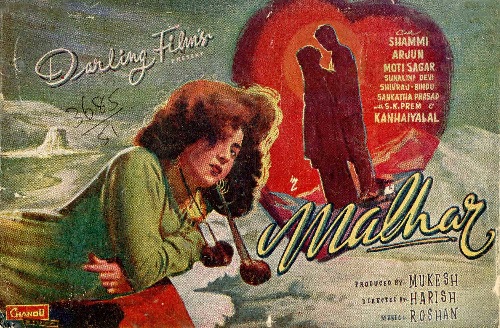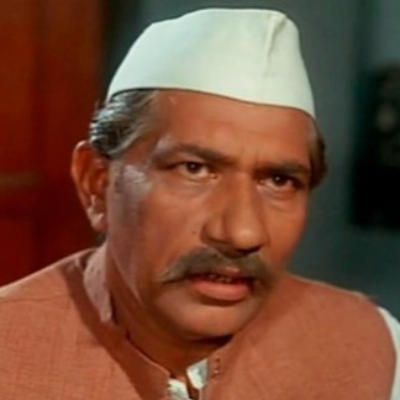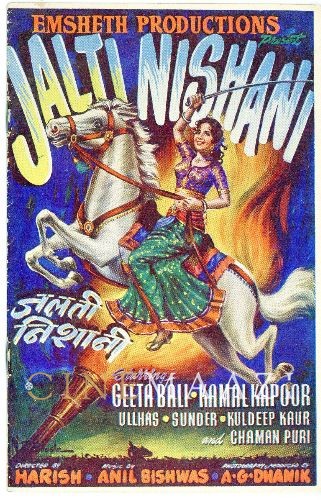This section is for paid subscribers only. Our subscription is only $3700/- for one full year.
You get unlimited access to all paid section and features on the website with this subscription.
Subscribe to read full article
This section is for paid subscribers only. Our subscription is only $37/- for one full year.
You get unlimited access to all paid section and features on the website with this subscription.
Not ready for a full subscription?
You can access this article for $2, and have it saved to your account for one year.
- GenreDrama
- FormatB/W
- LanguageHindi
- Run Time125 min
- Gauge35mm
- Censor RatingU
- Certificate Date12/11/1973 (Re-certification)
- Shooting LocationModern Studios
How low can a man fall even when dealing with his own sister? How selfless can a true lover? How long can a husband live at peace with a wife who is in love with another?
These are some of the questions "Malhar" poses and goes on to find an answer to of a poignant triangle drama. Besides his renegade son, Anand, and his pretty daughter, Reshmi, there was another soul sheltering under the same roof. Son of a deceased friend of his, young Rattan had been brought up by Thakur Sahib from a kid and given a place in his affections as conspicuous and unchallengeable as that occupied by his own son and daughter. Handsome, bright-eyed, well-mannered Rattan soon carved for himself a well recognised niche in the home of his adoption.
It may have been mere calf-love at first but as the ears rolled by and the three children grew bigger Reshmi and Rattan showed an unmistakable fondness of each other- an attachment upon which the aging Thakur smiled in silent benediction and his hot-tempered, wasteful son frowned malignantly.
The scheming Anand patiently bided his time. He knew he had not long to wait. His father kept indifferent health and, soon, very soon, he would be dead and then....
So, as soon as the old Thakur was cremated. Anand promptly ignored his father's besides behest that the Reshmi-Rattan union should not only be encouraged but duly permitted to find a logical conclusion. Instead, progressively increasing his severity towards the young lover, he finally turned him out of the house-the big old house that had been the only home helpless Rattan had known ever since he could remember-and gave away his bitterly anguished, but uncomplaining, sister in marriage to rich, happy-go-lucky college friend of his named Bihari. He considered the later a fruitful source for the financing of his own profligate pursuits-a kind of a golden goose with capacity to lay indefinitely.
Rattan had inherited from his father and old family mansion. In their youthful, romantic fancy, Reshmi and he had built dreams around it, planned to make it their home in due course. "You an you alone," he had vowed to her, shall be the first to step into fate had willed that he should choose the latter course. So, about the same time as Reshmi was going the seven steps with Bihari around the sacred fire, another larger fire-started by the disappointed lover-was consuming his own large house, to the accompaniment of the hooting of owls and the howling of an unkind wind.
Here the story enters its second phase, depicting the struggle of a beautiful, conscientious, well-bred girl, torn between a love imposed on her by custom and religion and another dictated by the heart. Reshmi gathered around her an apparently impregnable crust of fatalism. As a wife she had a duty to perform. She performed it with a fanatic fervour that held people spellbound. She obstinately refused to listen to the anguished cry of her heart. She overworked herself. She tried all she could to forget the past, to think only of the present. To outdistance the painful memories that were for ever threatening to overtake her became with her an obsession.
But it was an unequal struggle. Reshmi found herself overwhelmed by this psychological conflict. The emotional juggernaut made short shrift of her. She fell ill, recovered, fell ill again and given up as incurable on the suggestion of a selfish, short sighted mother-in-law, was segregated in to the hut of their gardener and thee left to die.
The gardener... the mali. What unseen cords drew Reshma to this unkempt, why did his eyes pop out of their sockets on seeing what he did? Did Reshma live to love and live again? Why? What? Where? When?
Patience, Sir. Patience, madam. You're just going to have these mysteries unravelled before you. You have the run of the swhole vessel-and no holds barred. In the meantime, our sincere thanks for coming. If you like 'Malhar' we are sure you'd tell others your opinion of it. Ladies and gentlemen, here's the switch-off. And the switch-on. Now keep your eyes glued to the screen.
[From the official press booklet]

Cast
Crew
-
BannerDarling Films Bombay
-
Director
-
Producer
-
Music Director
-
Lyricist
-
Cinematography
-
Editing
-
Sound Recording/ Audiography
-
Make-up
-
Laboratory/ Processed atFamous Cine Lab, Tardeo
-
Music CompanyH M V
-
Art Direction
-
Song Recording
-
Story & Dialogues













.jpg)



